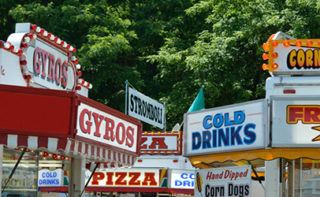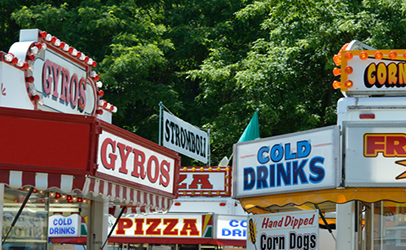Editor’s note: With summer unofficially beginning with this holiday weekend, the number of festive events and trips to farmers markets begin to balloon. Most offer foods and drinks that can easily pose food safety threats, especially for young children. Food Safety News encourages everyone to be mindful of frequent vectors for foodborne illnesses.
A fun family activity is attending county fairs, festivals, carnivals, art fairs, concerts and rodeos. Follow these tips to have a safe cooking, eating, and drinking experience at those events.
Fairs and festivals are exciting events and there are always fun things to see and experience, including art work, music, games, and rides. One of the biggest draws to these events is the many different types of foods and drinks available.
Sometimes the usual safety controls in a kitchen, like handwashing facilities, refrigeration, thermometers to check food temperatures, and workers trained in food safety, may not be available when cooking and dining at fairs and festivals. This makes it even more important for you to follow food safety tips.
Remember that food safety practices are the same at fairs as they are at restaurants and at home: Clean, Separate, Cook, and Chill. Learn more about these steps, and reduce your chances of getting food poisoning. If you see anyone preparing or serving food or drinks without following all four steps, consider eating elsewhere.
Learn how to avoid food poisoning when eating out.
Consumers
 What should you consider before buying food from a vendor?
What should you consider before buying food from a vendor?
- Does the vendor have a clean/tidy workstation?
- Does the vendor have a sink for employees to wash their hands?
- Do the employees wear gloves or use tongs when handling food?
- Does the vendor have refrigeration on site for raw ingredients or pre-cooked foods?
- Has the vendor been inspected? Is a recent inspection report available? Requirements vary by state, but in general temporary and mobile vendors, like those at fairs and carnivals, should have a license to sell food and beverages in a particular state or county for a specific time period. You can check with the local health department to see if the vendors are licensed and if a food inspection has been completed.
Certain foods, including meat, poultry, and fish need to be cooked to a temperature high enough to kill harmful germs that may be present.
Wash your hands often.
Alternatives to consider at fairs and festivals
Taking food from home allows you to eat a healthy meal or snack as a family, while still enjoying the festive atmosphere around you. Don’t forget to keep safe food storage practices in mind. Always remember to keep cold foods cold and hot foods hot.
If you take food to a fair or festival from home, be sure to keep food handling and storage times in mind. Don’t let food sit out for more than two hours. On a hot day (90°F or higher), reduce this time to one hour. Be sure to put perishable items in a cooler or insulated bag.
Protection — Wash hands often
- Find out where hand washing stations are located.
- Wash your hands with soap and clean running water for at least 20 seconds. This video can also help you learn how to wash your hands the right way.
 Teach children how to properly wash their hands and monitor them to be sure they get the job done.
Teach children how to properly wash their hands and monitor them to be sure they get the job done.- Always wash hands after using the restroom, touching animals or their surroundings, after playing a game or going on a ride, before eating and drinking, after using the toilet, after changing diapers or cleaning up a child who has used the toilet, and after removing soiled clothes or shoes.
- Take hand sanitizers or disposable wipes in case there aren’t any places to wash your hands.
Report Illness
Anytime you think you may have gotten a foodborne illness, report it to your local health department, even if you have already recovered.
The local public health department is an important part of the food safety system. Often, calls from concerned citizens are how outbreaks are first detected. If a public health official contacts you to find out more about an illness you had, talk to him or her. Information from healthy people can be just as important as information from sick people in public health investigations. Investigators may need your help even if you are not sick.
 Vendors and Organizers
Vendors and Organizers
Requirements differ by state, but in general temporary and mobile food vendors should apply for a food license with the fair’s state or county health department. Many community-based organizations set up booths to sell various foods at local festivals and fairs too. There are special exceptions, but it is better to be safe than sorry — get a license!
Fair and other event organizers should include a person trained in food safety throughout the planning process, as well as have them present at the fair.
It is important that food safety steps are followed so the food served doesn’t make anyone sick. Try to limit the amount of food preparation preformed off-site, a practice known as cook-serve. Also follow the four basic food safety steps: CLEAN, SEPARATE, COOK, and CHILL.
Now you’re on your way to a safe and healthy summer!

